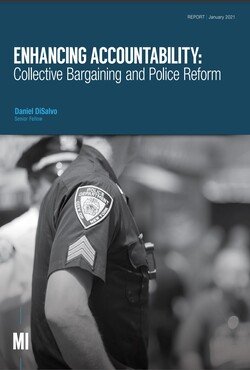Enhancing Accountability: Collective Bargaining and Police Reform
By Daniel DiSalvo
Protests and riots erupted in cities around the country in the wake of George Floyd’s death in police custody in Minneapolis last summer. Many criticisms of law enforcement ensued, and many observers and activists focused on police unions for supposedly protecting bad cops, thereby undermining police–community relations. Today, this claim is commonplace from writers across the political spectrum.[1] To improve policing in the U.S., the argument goes, job protections enshrined in union contracts and state statutes, which the unions have long fought for, have to be pared back.
While these claims are plausible, we know less than we should about the role that police unions play in protecting abusive officers and undermining police–community relations. Although some academic literature on police unions exists—in which many of the findings suggest that the unions inhibit effective and accountable policing— the subject has not been intensively studied.[2] Therefore, we do not know exactly what the reduction of job protections for officers or the alteration of collective bargaining could achieve; reformers and the public should keep their expectations in check.
That said, state and local elected officials reacted quickly to Floyd’s death and have passed new laws that seek to reduce police violence against civilians and improve public confidence in the police.[3] Some of the changes impinge on policies enshrined in existing collective bargaining agreements (CBAs).
This paper assesses the role of police unions in creating job protections for officers and how the recent wave of legislation interacts with collective bargaining and union contracts; and it identifies areas in which policymakers should concentrate in future rounds of collective bargaining in order to improve the performance of police departments and enhance public trust in them.
New York: Manhattan Institute, 2021. 12p.


